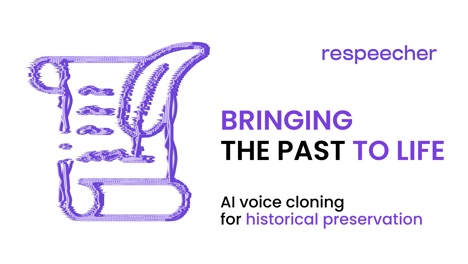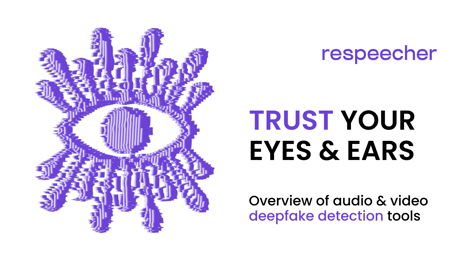How Voice Cloning Makes Dubbing and Localization Easier: The 3 Biggest Benefits for Studios

Is it possible to adapt the authentic dialog of an actor from one language to another so that nothing is lost in translation?
Things to consider would include idioms, cultural specifics, tone, the list goes on. What’s more, the technical side of the process also demands time, patience, and experience to be managed properly.
With machine learning and new AI voice cloning and AI dubbing technologies, the $2.5 billion localization and dubbing market is undergoing a major disruption. Today’s article explores the most relevant factors.
Challenges that dubbing studios must overcome
Of the $2.5 billion market capitalization mentioned above, 70% (1.7 billion) belongs to dubbing. With the growing popularity of streaming networks like Netflix, the demand for dubbing is on the rise. It is safe to assume that market capitalization will increase by another 30% over the next few years.
Simply put, dubbing is the process of translating and replacing original speech with the same speech in a foreign language.
Television shows, movies, and animated films are the most common examples of dubbed content. Every year, hundreds of films are dubbed into dozens of international languages in Hollywood alone.
Dubbing a video that contains a dozen voice actors with one and a half to two hours of audio material can take months. Here are the main reasons that cause the dubbing process to take so long.
Dubbing and cultural adaptation
When initiating a dub, a studio has to consider the target country's cultural aspects - references, jokes, names, idiomatic expressions, etc.
The literal translation of a dialog will not be understandable to an audience. Sometimes, it can even offend the viewer. Not all phrases and cultural references may be appropriate in certain regions. In this situation, edits are made to the text of the original dialog.
Synchronization difficulties
Three types of synchronization must be taken into account to allow a dubbed voice to fit the original video.
- Lip-sync: the voice is synchronized with the mouth articulations of onscreen actors.
- Kinesic: the voice is synchronized with body movements.
- Isochrony: the voice is synchronized with an original actor's utterances.
The problem is that an exact phrase in different languages may take additional time to pronounce when compared with the original.
This leads to the problem of audio ceasing to correspond with what is happening on the screen. This discrepancy spoils the experience for the viewer watching the dubbed film.
Business complications
To launch their content in multiple markets, production companies rely on the services of multiple dubbing studios around the world. The dubbing market is very conservative and over the past decades, every dubbing studio has revealed the same flaws.
- There are too few high-quality service providers.
- There is a limited number of voice actors employed by regional dubbing leaders. This results in having to use the same voices in almost every film that comes out in a particular region.
- In this regard, there is an almost constant queue for projects that studios are working on. This leads to significant delays in production schedules.
How speech-to-speech voice cloning is disrupting the dubbing industry
If you're not familiar with voice cloning, you can delve into applications for industries like film and TV, game development, and even dubbing and localization - as well as learn how Respeecher technology works.
In short, Respeecher's AI voice generator technology allows you to clone the voice of any person in such a way that it sounds like the voice of another person. Provided, of course, that the AI has an audio recording of sufficient length for the target voice.
Even when the client lacks high-res sources, Repeecher can make it work. Despite this challenge, we have built an audio version of the super resolution algorithm to deliver the highest resolution audio across the board. You can download this audio super-resolution whitepaper to find out more.
In practice, this means that through an AI voice changer your voice can be transformed, for example, into Beyoncé's voice. With this type of technology, your gender doesn't even matter.
The resulting recording will contain all the emotional accents you spoke into the recording and will come out the other end sounding like the famous singer.
This is what Shaun Cashman, Emmy award-winning animation Producer/Director has to say about the technology:
I first contacted the Respeecher folks during the editing process of my first documentary short. I was working with very old sound materials - over 35 years old - that had been damaged and rendered pretty much useless. Through their amazing technology, I was able to restore the dialog from the original tracks with a combination of cleaner, original VO samples, and my own voice that I converted into my original subject's voice, complete with natural intonations and cadence, and amazingly, the film was saved!
So let's go over some of the benefits of AI voice cloning for content creators and dubbing studios.
1. Imagine if the actors on a TV show could speak ten languages fluently
Or maybe 20 or 30, why not? Of course, then you wouldn't need dubbing :) With Respeecher, you don't just dub a target actor's voice, for example, in Chinese. You can make it so that the Chinese voice acting belongs to the same voice.
It is as if your actor has learned a foreign language on their own and is dubbing themselves. All this is possible because our AI speech-to-speech technology clones the voice itself, and what language this voice is speaking does not matter.
The speech of any dubbed actor can be easily transformed into the original voice of the actor. And this is a game-changer for every dubbing and localization studio.
With this type of technology, you can do dubbing in languages outside of your regional specialization. To do so, all you need is access to at least one native speaker for your target language.
2. Dramatically shorten the dubbing process in multiple languages
Considering that a studio is no longer dependent on the voice (or even the free time) of a specific dubbing actor, they can significantly speed up the dubbing process. A studio no longer needs to wait in line for particular voice actors to become available, and the actors themselves can generate more income without being physically present during production and post-production.
Any native speaker of the target language that has some training can act as the voice double. This speeds up the dubbing process tenfold and gives way to other enjoyable benefits.
3. Distribute workloads between voice actors to reduce the costs of dubbing
For both customers and dubbing agencies, the cost of content production is reduced to a fraction of its original cost.
Now one actor can voice dozens of different roles, including those of another gender.
Artificial intelligence easily converts the speech of the stunt double into the target voice. All this allows for the workload to be easily distributed between actors within agencies as gender is no longer a deciding factor, made possible by what is not called AI dubbing.
If you are looking to expand your dubbing agency’s presence and gain an essential competitive advantage, contact us today. We will help you choose the best workflow and pricing for your business.
FAQ
AI voice cloning for dubbing uses speech-to-speech voice cloning to replicate an actor's voice in multiple languages, enabling AI-driven localization for faster, more authentic dubbing without needing the original actor’s presence.
Speech-to-speech voice cloning transforms an actor's voice into the target language, maintaining actor authenticity and cultural nuances, enhancing multilingual dubbing while speeding up the process for AI-driven localization.
Dubbing studios face challenges in synchronization, cultural adaptation, limited resources, and long production timelines. AI voice cloning solutions like Respeecher AI dubbing help streamline these issues by offering faster, more efficient workflows.
Respeecher ensures ethical use by implementing clear voice cloning ethics and regulations, offering AI voice cloning for dubbing only with consent, and utilizing watermarking technology to prevent misuse.
AI dubbing enables multilingual dubbing, speeds up localization, reduces production costs, and maintains actor authenticity, transforming the dubbing industry by using AI voice cloning to replicate voices across languages efficiently.
AI voice cloning ensures actor authenticity by accurately replicating the original voice’s emotions, cadence, and prosody in multiple languages, creating a seamless experience in multilingual dubbing.
Dubbing agencies benefit by reducing costs, increasing output, and improving voice cloning solutions with AI-enhanced workflows, which help speed up the process and eliminate scheduling conflicts for voice actors.
Future advancements in AI voice cloning for dubbing will focus on enhancing localization, AI-driven dubbing workflows, expanding language options, and improving voice authenticity to provide an even more immersive and efficient dubbing experience.
Yes, AI voice cloning allows for accurate translation and speech-to-speech technology ensures that cultural nuances, idioms, and tone are preserved while maintaining the actor’s authenticity in the target language.
Glossary
AI voice cloning for dubbing
AI voice cloning for dubbing uses speech-to-speech voice cloning to replicate actor voices in multiple languages, transforming the dubbing industry with AI-driven localization and multilingual dubbing for faster, more efficient workflows.
Speech-to-speech technology
Speech-to-speech technology enables AI voice cloning by converting speech into another voice, driving AI-driven localization and transforming the dubbing industry for multilingual dubbing.
Multilingual localization
Multilingual localization leverages AI dubbing and speech-to-speech voice cloning to create seamless AI-driven localization, enabling multilingual dubbing with high accuracy.
AI voice generator technology
AI voice generator technology offers AI voice cloning benefits like faster AI dubbing, multilingual dubbing, and AI-driven localization, transforming the dubbing industry.
Ethical AI in dubbing
Ethical AI in dubbing ensures responsible use of AI voice cloning, promoting transparency in AI dubbing, multilingual dubbing, and AI-driven localization for media production.
Respeecher AI solutions
Respeecher AI solutions offer advanced AI dubbing, speech-to-speech voice cloning, and AI-driven localization, transforming multilingual dubbing and media production workflows.








